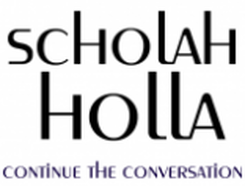
I'm currently curating two ongoing projects that are near and dear to my interests: the Playwright Incubator Program and the Schollah Holla Project.
I'd like to take this opportunity to discuss the Schollah Holla Project, as it has already had public events, and as we have one more Holla coming up soon as part of our programming for our production of Vinegar Tom (January 27th for those of you intending to come).
The main purpose of the Schollah Holla is to present scholarship in a way that is both relevant and accessible to audience members and working theatre artists, as well as to create opportunities for junior scholars to share their knowledge and expertise with said audience members and artists.
One of the things about how this project is turning out that I'm particularly proud of is how the panels balance intellectual rigor with accessibility. The overwhelming majority of our panelists thus far have been not only accomplished scholars and educators, but also working theatre artists.
What distinguishes The Schollah Holla Project from other panels is that it is an academic panel (in the strict sense) geared towards a popular audience. This means that everyone on the panel either has a doctorate or is actively engaged in the advanced stages of completing one. This is not in any way meant to disparage research done outside the academy, but it does mean that everyone speaking has passed through a specific rigorous process and has had their ideas and knowledge tested formally at the highest levels. With that said, these scholars are asked to share their expertise without defaulting to specialist language that is only really understood by other advanced academics. This does not mean that the material is "dumbed down" by any means. The great physicist Richard Feynman once said words to the effect that any aspect of physics that could not be taught in an undergraduate lecture was an area that science did not yet fully understand.
I wrote a bit about our first panel a few months ago. That first panel spoke to a full house, some of whom changed their tickets in order to attend, others who had seen a previous performance and came back to hear the scholars' panel. We had an incredibly positive response, and so we decided to move forward with it as an ongoing project. I had been jokingly referring to it as our "Schollah Holla," and then the name stuck and we made it official. As these panels were originally envisioned as "fireside chats," the informality of the name seems appropriate. Our second Schollah Holla was held in conjunction with our co-production with ArtsEmerson of Ted Hughes' Tales from Ovid , and also had quite a turnout.
Should anyone be interested in duplicating our project, this is the recipe:
I recommend that theatre companies looking to initiate such a project enlist a scholar to curate it. That said:
1) Panelists are first selected/enlisted based on how their research specialties speak to the production at hand. Ideally, there should be a range of disciplines represented that each relate to the work in a different way. For example, our panel for Trojan Women included a theatre historian, a performance theorist, and a Classicist.
2) Panelists/Schollahs are sent a list of talking points a week or two before the Holla, and invited to add talking points of their own, and/or specify which points they would like to address during the Holla itself.
3) They attend the show (we've decided that Hollas work best after a matinee) and after the Holla is announced they have a few minutes to confer briefly with the moderator (myself in this case) and each other about any additional specifics they'd like to touch upon.
4) The panel itself takes place. For us it runs about an hour and is split into three parts (remember that most of the audience has already seen a performance and so this is essentially adding an extra act):
In the first (and longest) section, the Schollahs address selected talking points as prompted by the moderator and respond to each other. As we are dealing with high level academics, they've often read (or reread) the play they are responding to as well as secondary sources and background information in preparation for the Hollah (sometimes in the original Klingon). This is often where the audience can learn more about the cultural and historical background of the work, as well as critical and philosophical responses to the material.
The second section (which tends to be brief) is where the Schollahs can ask questions and respond to performers and production staff members who have chosen to make themselves available.
In the third part of the Holla, the floor is opened to the audience to respond and ask questions of the Schollahs. As Whistler tends to attract smart audiences, this segment has proven to elicit some pretty smart discussions. (At no point has anyone turned to an actor and asked them "How did you manage to learn all those lines?")
As we're looking forward to this being an ongoing project, we're always looking to meet new scholars who can take part in these panels. I've chosen to use people from advanced candidacy to junior faculty (and independent scholars with doctorates) as within that range, academic hierarchy between panelists is not an issue, and also because providing junior scholars with a public forum is in fact a service to the academy. I would encourage other theatres to enlist a scholar and follow this formula to create their own Hollas (and welcome any questions on how to get it started). I also have ambitions on how to expand the project, and I hope to get to write more about those as they come closer to actualization.

 RSS Feed
RSS Feed